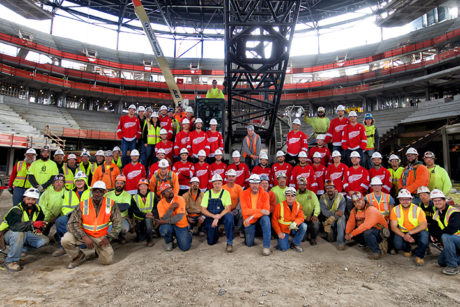Little Caesars Arena stands as a glowing symbol of Detroit’s economic resurgence.
Admittedly, the Detroit tax-payer supported arena is fueling job creation and spin-off developments, but not for us in Detroit.

Something’s clearly amiss when 90 percent of the hard hats in the arena and other publicly-funded construction sites are worn by Caucasians.
It seems Detroit leaders have not learned the lesson the 1967 Detroit Race Riot imparted. Segregation is bad for business.
Any system or practice that separates people according to color, ethnicity, or caste is a form of Apartheid.
Detroit’s apartheid is built on race and socio-economic class.

ECOCONOMIC SEGREGATION ABOUNDS
Look around our neighborhoods today and you will see plenty of evidence of economic segregation.
Nearly 40 percent of our adults and 58 percent of our children live in poverty. Like housing discrimination stoked the tension leading to the 1967 civil uprising, today’s employment discrimination is stoking a similar flame.
The middle class we once enjoyed has eroded. The no and low-skill jobs that helped lift our parents and grandparents out of poverty are gone.
The many who anticipated filling future factory jobs much like their elders are now among Detroit’s lost generation.
EDUCATION SYSTEM, BROKE LIKE US
While 78.3 percent of Detroiters have a high school diploma, for many it is not worth the parchment it is printed on. Why?
For the past 100 years schools have had a four-track system.
· College Prep
· Vocational
· General Education
· Special Education
Those lucky few, the 20 percent who managed to stay on the college prep track, often came from more affluent families who helped steer student focus on algebra, geometry, chemistry and physics – the areas of concentration required for university-level course work.
Armed with a degree, these privileged few rose to achieve economic success and security and now stand among Detroit’s leadership.
The remaining 80 percent were far less prepared and vulnerable. The majority of those who were poverty stricken had little hope of getting or staying on the college prep track. That nearly guaranteed the only job they would be qualified to fill would be in the factory or service industry.
These statistics put the 111,000 Detroiters without post-secondary training and education on a train destined to derail.
FAILURE TO FIX
Leaders, who could have admitted and corrected the failures of five generations, have not. So the employment and economic gap continues to widen as our city leaders divert billions of dollars from school/library budgets for Detroit development projects that employ far too few Detroit residents, deemed “unqualified” to fill open jobs.
As a result, many of our young people are struggling to find jobs with a livable wage. They are unqualified for today’s high-paying, high-demand tech- and skill-based jobs because Detroit’s PK-12 schools did not provide them the requisite skills – math, computer programming and critical thinking – for these jobs.
TECHNOLOGY FOR SOME, BUT NOT ALL
Sadly, I sat in a meeting last week with community leaders, who adamantly oppose technology in Detroit classrooms. Picking which student is worthy of being prepped for post-secondary training and an affluent lifestyle is the height of employment discrimination.
Detroit leaders, realizing entrepreneurship may be the only income-generating vehicle for residents, have poured monies into entrepreneur-of-color loan funds to fix this institutional employment discrimination, only to reinforce classism.
Most of the available funding has been distributed to well-heeled business owners, who are better educated than their poverty-stricken brethren unable to meet entry-level requirements for such programs.
STEEP CLIMB
The climb is steep for those at the bottom.
It’s impossible to borrow monies for a business when you are struggling to live, eat and get to work. There are no true startup pre-revenue entrepreneur grants/equity programs, no funded prototype invention support and no business contracting programs for the poverty stricken.
Detroit leaders must have a real dialogue regarding this divide built on race and socio-economic class that was the backdrop of the 1967 Detroit Race Riot. They need to fund grassroots organizations for workforce development, entrepreneurial activity and academic summer camps.
Only then will we have a construction site filled with us all.
Editor’s Note: Ida Byrd-Hill, an urban economist, futurist, and transformer of six urban public schools, is the president of Uplift, Inc., a nonprofit tech diversity and inclusion firm where she combines her personal experience of migrating out of poverty with her corporate experience in executive search, finance, human resources, marketing and sales to assist corporations develop talent for their employee base.
She is creator of Automation Workz, a math- and tech-based scavenger hunt and pre-apprenticeship program. Ida has a BA in economics from the University of Michigan-Ann Arbor and a MBA from the Jack Welch Management Institute.
For more information visit: www.autoworkz.org
Lead archive photo courtesy of District Detroit
.


